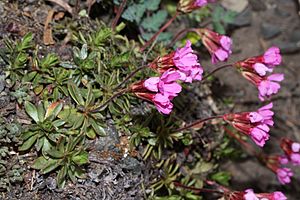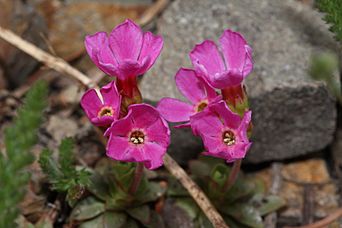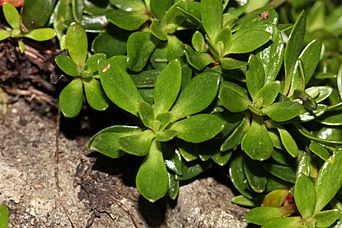Androsace laevigata facts for kids
Quick facts for kids Androsace laevigata |
|
|---|---|
 |
|
| Growing in Olympic National Park, Washington | |
| Scientific classification | |
| Synonyms | |
|
Androsace laevigata, also known as the cliff dwarf primrose, is a beautiful flowering plant. It belongs to the primrose family, called Primulaceae. You can find this plant growing in the mountains along the central Pacific coast of North America. This includes parts of British Columbia, Oregon, and Washington, west of the Cascade Range. It usually grows below 8,000 feet (about 2,400 meters) in places like cliffs, rocks, and high mountain areas.
What It Looks Like
The cliff dwarf primrose is a small plant that forms a mat on the ground. It is a perennial plant, which means it lives for more than two years. The plant usually grows about 2 to 7 centimeters (1 to 3 inches) tall. Its flowers have five petals and are a deep pink or rose color. Each petal is about 4 to 5 millimeters (0.16 to 0.2 inches) long.
How It Got Its Name
Androsace laevigata was first described by a scientist named Asa Gray in 1880. He originally called it Douglasia laevigata. Later, scientists used a method called "molecular phylogenetics." This is like studying the plant's DNA to understand its family tree. This research showed that plants in the Douglasia group actually fit inside the Androsace group. So, in 1961, another scientist named Wendelbo moved it to the Androsace group, and that name is now accepted.



